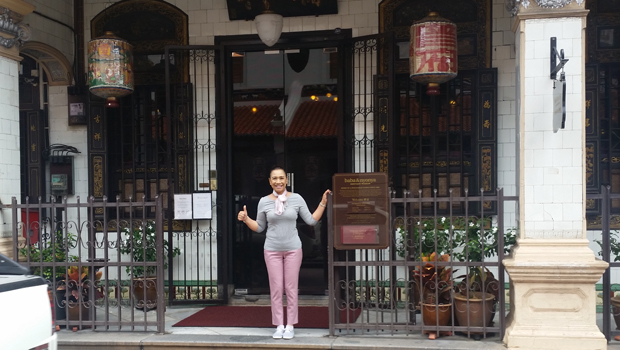
A Princess Tale in the heart of The Heritage City Malacca
By Lynn Zubir
THOUGHT I have been everywhere while in Malacca; the attractions, the theme parks, the zoo, the shopping and not forgetting pampering my palate with all the many varieties of delicacies found nowhere else.
Nevertheless, that one fine day, I was passing by this road called Jalan Hang Li Po on my way to Banda Hilir and nearby I saw a line of buses parked along the sides and people flocking around an old uncovered brick well.
Suddenly, it kindled my curious mind as always; what is so special about this little princess fairy tale that people from as far as the Great Wall of China travelled just to have a peek at The Well or The King’s Well or Perigi Raja. Easy for me to say the well of many names; but the one well that people talk about most and is well-known to all tourists is now called “Perigi Hang Li Po”.

“Perigi Hang Li Po” or The King’s Well
PRINCESS Hang Li Po was said to be the fifth wife of Sultan Mansor Shah from the Sultanate of Malacca in the 15th Century, and was sent to marry the Sultan by the Emperor of the Ming Dynasty. In return, the Sultan gifted a piece of land to the Chinese, now known as Chinese Hill or Bukit Cina. Perigi Hang Li Po, found at the foot of Bukit Cina, was constructed by the princess’ entourage for access to fresh water. The well is reputed to be always filled even during drought. And today, it has become a wishing well to everyone who comes to visit. Locals say that if you throw a coin inside the well you are likely to return to Malacca. I guess only the owners of the coins will know how true this is.
Bukit Cina and the two adjoining hills today formed a Chinese graveyard covering over 250,000 square metres with over 12,000 graves, some of which dating back to the Ming Dynasty. It is said to be the largest Chinese graveyard outside China.

Largest Chinese graveyard outside of China dated back to the Ming Dynasty
It is believed that Admiral Cheng Ho voyaged and escorted Princess Hang Li Po to Malacca to become the bride of the Sultan of Malacca. Local folklore tells of a brave admiral sent by the Ming Dynasty to establish regional diplomatic and entrepot activities between the Chinese Empire and the Kingdom of Malacca. The Chinese expedition was said to have dug several wells at the foot of Bukit Cina, known as The Seven Dragon Wells. Today only three wells are left intact after some were demolished to make way for roads. Just like Perigi Hang Li Po, the Seven Wells are also reputed never to dry up even during the worst droughts.
According to the legend, the nobles (500 sons of ministers) and servants who accompanied the Princess initially settled in Bukit Cina and eventually grew into a class of Straits-born Chinese known as the Peranakans. Peranakan Chinese or Straits-born Chinese are the descendant of Chinese immigrants who came to this Malay archipelago; they were also famously known today as Baba-Nyonya.

The Nyonya’s clothing of Kebaya Nyonya with three Keronsang (brooches)

Hand made beaded slippers form one of the many cultures Baby Nyonya descendants had retained
Today, the Peranakans retained most of their ethnic and religious origins, but assimilated the language and culture of the Malays. The Nyonya’s clothing like Kebaya Nyonya with Batik Sarong and three Keronsang (brooches) that comes with it. Not forgetting the unique and beautiful Peranakan beaded slippers. Who can forget the many colourful varieties of the Baba-Nyonya kueh (cakes), Chicken Pong Teh and Baba-Nyonya Laksa. Just to mention a few and already my mouth waters.
If you happen to be in Malacca and you want to find out more about this unique beautiful culture of the Peranakans, check out the House Museum or The Baba-Nyonya Heritage Museum. It is a three terrace lots that were acquired by the Chan family where four generations lived since 1861 before it was opened as a museum in 1985. Once you enter the house, it will take you back to the 19th century that offers a glimpse into the richness of the culture and the opulence that was fashionable in many pre-World War II Peranakan homes.
Trust me, it is like going into another world.

The Baba Nyonya heritage museum, was one of the many Pre-World War II Peranakan homes
And today, everyone who visits Malacca will love to see what’s left of this amazing legend of Princess Hang Li Po and the brave Admiral Cheng Ho as what was told in my history class. Similarly, the younger generation might also find it captivating to relive the tale of a love story between a beautiful Chinese Princess and a charming Malay Sultan.
Who said history is not fun to know.



 Previous Article
Previous Article Next Article
Next Article